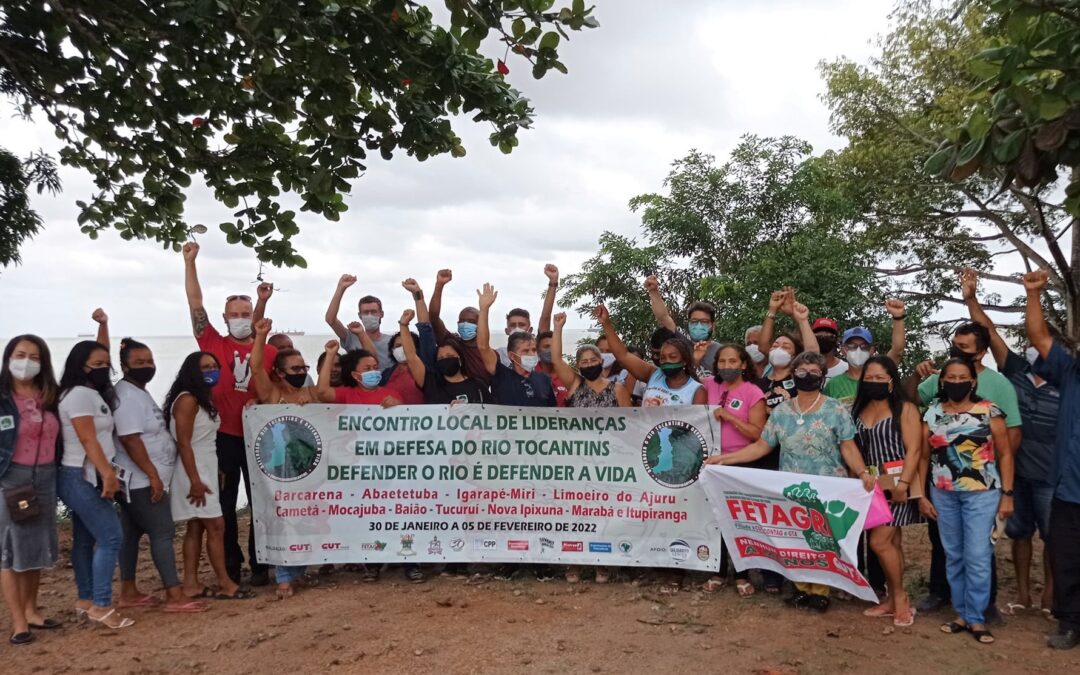
Mar 23, 2023
Brazilian communities along a river near the Amazon are celebrating the government’s decision to halt a blasting and dredging project that could destroy their livelihoods and severely damage the environment. Earlier this month, the Public Prosecutor’s Office recommended that the Brazilian Institute of the Environment and Renewable Natural Resources (IBAMA) suspend its preliminary license for the Araguaia-Tocantins waterway project in the state of Pará.
In suspending the license, the government cited the absence of prior consultation with residents who would be impacted, especially Indigenous communities and quilombolas, and the lack of information on the effects of the project on the communities.
The victory “has impacts not just for the local community, but also for the state and even further,” says Carmen Foro, speaking through an interpreter. Foro, a rural activist from the area, is former secretary-general of the Unity Worker Center in Brazil (CUT). “I feel that I and other community members are being heard, that we have opened a dialogue that this project can’t happen without our participation.” (Foro described her community’s fight for survival in a Solidarity Center Podcast episode last year.)
The project would have involved heavy dredging of the Tocantins River and require removing miles of the rocky Pedral do Lourenço river bed to increase navigability during the dry season and facilitate commodity export. IBAMA approved the preliminary license to begin the project in October 2022, ignoring several government agency recommendations.
Key to Success: Mobilizing a Diverse Coalition
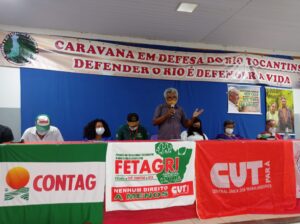
Members of the Caravan in Defense of the River Tocantins meet with residents of Nova Ipixuna to discuss a proposed waterway project that threatened livelihoods and the environment. Credit: Amazon Community
“This time in world history, it is really important to connect to the diversity around us,” Foro said. The campaign was victorious because “we created a grand alliance between the unions and with other movements, like quilombos, the Catholic Church, young people, women, fishers. And that alliance is what gave us strength.
“It was a collective struggle.”
These diverse groups, with support from the Solidarity Center, formed the Caravan in Defense of the Tocantins River to raise awareness about the negative impacts of the waterway construction and demand that the government honor international treaties respecting Indigenous and Tribal People’s right to safeguard and manage the natural resources on their lands. They reached thousands of people, through riverside meetings and in online forums.
With its strength in workers’ collective voice, the Brazilian labor movement was well-positioned to respond to the needs of workers and their communities, including the impact of climate change and environmental degradation on jobs and communities. “The unions in those cities are kind of seen as the principal organization in the social movements,” she said. “Along with the CUT, they were able to be an umbrella organization and give us support.”
The Struggle for Democracy Cannot Rest
Foro, who recently was selected by the new administration of President Luiz Inácio “Lula” da Silva to serve in the Ministry of Women, says “many women will be impacted by this project, and through my role now at the Ministry of Women, I plan to be alongside the women who are going to be impacted by this project.”
The license suspension is a huge victory, but the process is not over. “Everyone knows that this recommendation doesn’t resolve the issue,” she says. “The problem is still there and it will be a long journey. There still will be something in the middle between this recommendation.”
While she is hopeful about working with the new administration, whose election with the support of union and community groups opened dialogue with historically marginalized communities along the Amazon, Foro is keenly aware they must work to ensure the democratic process thrives.
“It’s important that we continue the fight, continue the struggle. Even with a democratically elected government that is representative now, there is still pressure that is coming from all different sides. The workers are part of that, but also there is the pressure from large companies, and agro-business as well. We have to continue to fight.”
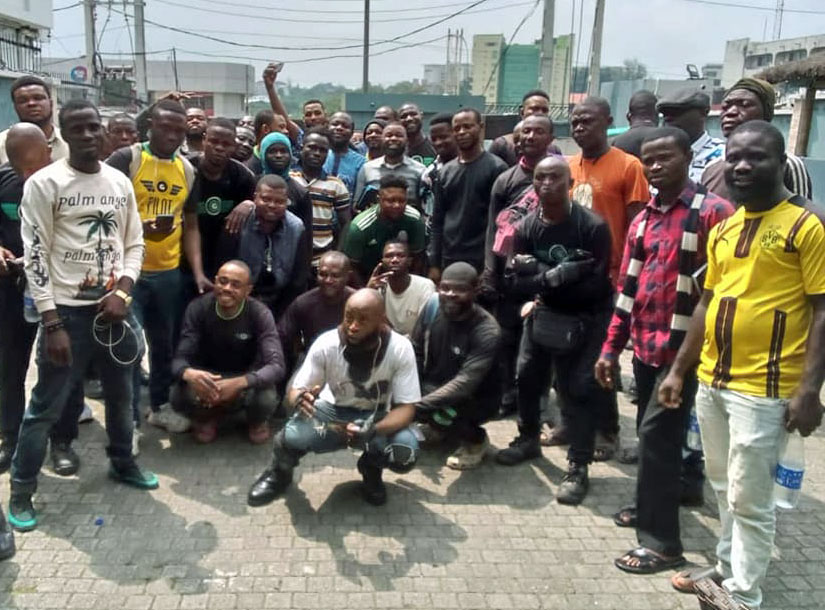
Feb 7, 2023
Drivers in Nigeria won the country’s first union covering platform-based workers, a victory that shows it is possible for “unions to organize workers in the gig economy,” says Ayoade Ibrahim, secretary general of the Amalgamated Union of App-Based Transport Workers of Nigeria (AUATWN).

Platform workers in Nigeria join with Labor Ministry officials to finalize recognition of their union, AUATWN. Credit: AUATWN
The Ministry of Labor’s recognition of AUATWN empowers it to have a say in determining the terms and conditions of drivers working for Uber, Bolt and other app-based transportation companies in the country, and covers drivers who deliver food and passengers or engage in other services. The union worked with the Nigeria Labor Congress throughout the campaign for recognition.
In a statement approving AUATWN as union representative of app-based workers last week, the Labor Ministry pointed out that while the freedom to form unions and collectively bargain are internationally protected rights, workers in the informal sector, such as app-based workers, often are not included.
“Today, we are breaking new ground with those in the informal sector who are employing themselves,” the Labor Ministry said. Some 80 percent of Nigerians work in informal sector, as the lack of good jobs—the official unemployment rate is 33 percent, with youth unemployment at 43 percent—leaves workers with few options beyond selling goods in the market, domestic work or taxi driving.
In Nigeria, as in countries around the world, app-based drivers often must work long hours to support themselves and pay for expenses like vehicle maintenance, insurance and car leasing. Excessive hours lead to accidents, says Ayoade.
“I work 15 to 18 hours a day. Long hours working is actually not safe for drivers,” says Ayobami Lawal, a platform driver in Lagos. “That is why you see in the news that the driver had an accident. It is because of fatigue, because there is no time to rest.” Drivers also risk being assaulted and even killed on the job, as platform companies do not screen riders. By contrast, riders have access to drivers’ name and personal phone numbers.
In April 2021, platform drivers and their associations in Nigeria went on strike, demanding that Uber and Bolt raise trip fares to make up for the increased cost of gas and vehicle parts. They also launched a class action suit in 2021 against Uber and Bolt, seeking unpaid overtime and holiday pay, pensions and union recognition. Following the protests, Uber increased fare costs on UberX rides and UberX Share in Lagos, a move that did little to improve drivers’ pay and nothing to improve conditions.
‘We Must Be United’
App-based drivers in Nigeria began seeking union recognition in 2017, after drivers’ income was slashed by 40 percent, says Ayoade, a father of three who that year was forced to drive 10-hour days to make the same income he had previously earned for fewer hours. When Uber and Bolt first launched, drivers were paid enough to work without putting in long hours. But the companies’ price wars to lure passengers and increased driver fees, including commissions up to 25 percent per rider, slashed driver pay.
As the process to register a union with the government dragged, platform worker associations made key gains in mobilizing workers through Facebook, WhatsApp and, most recently, Telegram. The campaign also includes legal action and lobbying Parliament to extend labor laws and social protections to workers in the informal sector.
Three worker associations engaged in the campaign—the National Union of Professional App-based Transport Workers (NUPA-BTW), the Professional E-hailing Drivers and Private Owners Association of Nigeria (PEDPAN) and the National Coalition of Ride-Sharing Partners (NACORP)—last year joined together to form AUATWN.
“We cannot go to war with a divided mind,” says Ayoade. We must be united before we can achieve. The fact that we are united now, we are fierce. We’re trying to involve everybody.”
App-Based Workers Making Gains Worldwide
Unions face unique challenges organizing app-based workers, but by mobilizing members through online apps, unions also have the ability to involve more workers in meetings, education and other opportunities.
“Everybody is included,” says Ayoade. “It’s a more democratic process. We have delegates for unit leadership. If the delegates can’t join for a physical meeting, they can join anywhere.”
Members’ questions can be quickly answered on social platforms and the union operation is more transparent. For instance, he says, members “will see how the money to the union is moving from the app to the account. Every member knows how the money will be used.”
Platform workers in countries worldwide are joining together to better wages, job safety and other fundamental rights guaranteed by international laws. In Kyrgyzstan, gig workers at Yandex Go formed a union and won better wages, while a new report finds that workers on digital platform companies who are pursuing their rights at work through courts and legislation are making significant gains, especially in Europe and Latin America. The Solidarity Center is part of a broad-based movement in dozens of countries to help app-based drivers and other informal sector workers come together. Members of the International Lawyers Assisting Workers Network (ILAW), a Solidarity Center project, have assisted platform workers in many of these cases.
While celebrating the new union, Ayoade also is mindful of the cost some workers paid for a lack of decent work.
“Some of the people we started together with in this campaign, they lost their life along the line,” he says. The lack of insurance or social benefits mean that if drivers are attacked or robbed or even die on the job, they and their family are left all on their own. “They have children, they have parents, who received nothing,” he says.
Although he is bullied and even threatened for his work, Ayoade says such tactics only make him see his efforts are effective. “God gave me the opportunity to help people in this struggle. I am doing something that is improving people’s lives.”
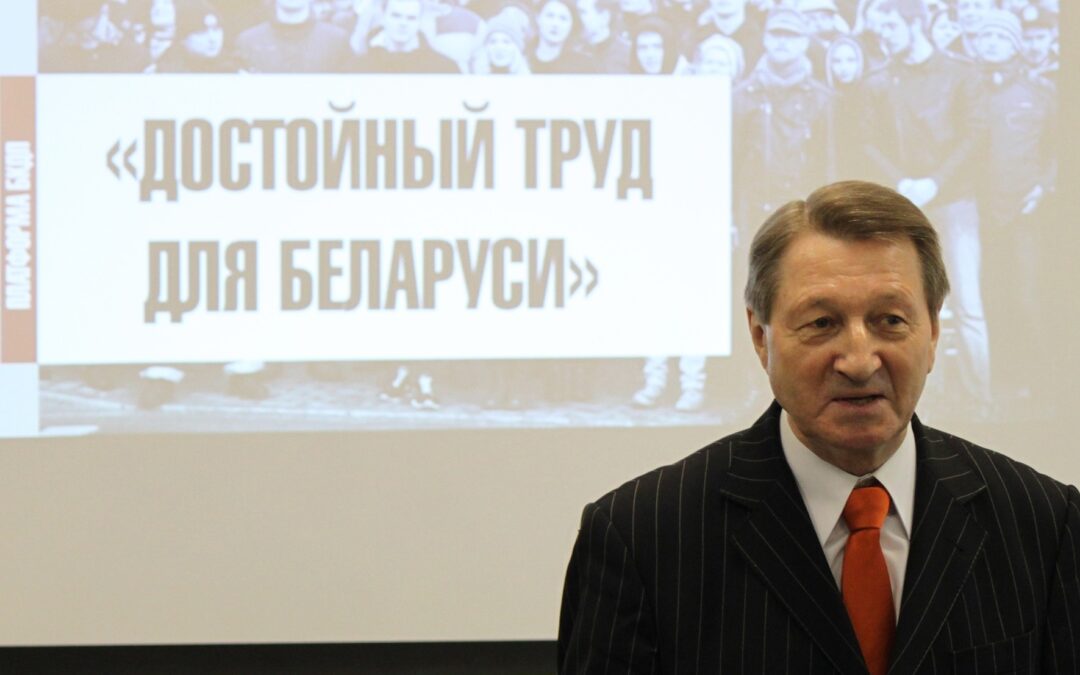
Dec 5, 2022
In the wake of a new wave of prison sentences against union leaders and other activists arrested earlier this year, new Belarus worker rights organization Salidarnast is tracking and disseminating updates on union political prisoners’ legal cases, and providing other worker rights news.
Belarusian Congress of Democratic Trade Unions (BKDP) President Aliaksandr Yarashuk, jailed since April and facing 14 years in prison, was elected in absentia to an ITUC vice-presidency at the organization’s 5th World Congress last month, reports Salidarnast.
Other updates include:
- Extraordinary mistreatment of two jailed union leaders, Leanid Sudalenka and Volha Brytsikava, for which Brytsikava reportedly started a hunger strike on November 8 and was released last week after having spent more than 105 days behind bars this year–including 75 consecutive days in the spring
- Continuation of a ten-person trial associated with worker organization Rabochy Rukh for which the accused are facing prison sentences of up to 15 years for high treason, among other charges
- Grodno Azot fertilizer factory worker and chairperson of the independent trade union there, Andrei Khanevich, whose phone was tapped by Belarusian special service, sentenced to five years in prison for speaking with a BelSat TV reporter
- Belarusian Independent Trade Union (BNP) Vice Chairperson and Chairperson of the Local Trade Union at Belaruskali fertilizer factory, Aliaksandr Mishuk—detained since May—sentenced to two and a half years’ imprisonment
- Free Trade Union of Metalworkers (SPM) Deputy for Organizational Work Yanina Malash—mother of a minor child and detained since April—sentenced to one and a half years’ imprisonment
- Vital Chychmarou, a former engineer fired in 2020 for trade union activities and manager of an SPM organization, sentenced to three years of home confinement
- Free Trade Union of Metalworkers (SPM) Trade Union Council Secretary Mikhail Hromau—detained since April—sentenced to two and a half years of home confinement
- Genadz Bedzeneu, who attempted to start a local union for Polotsk stall market workers, arrested.
Salidarnast is filling an information void created after the Lukashenko government in July forcibly shut down the BDKP and its affiliates, compounded by the detention of dozens of journalists and media workers with other civil society defenders. The number of political prisoners in Belarus stood at almost 1,500 in November, reports the European Federation of Journalists (EFJ); up from 1,000 in February. The Belarus Supreme Court in July dissolved the BKDP and its four affiliates: BNP, the Union of Radio and Electronics Workers (REP), Free Trade Union of Belarus (SPB) and SPM.
Salidarnast on December 1 flagged the arrest of at least five people at the Miory steel plant, warning of imprisonment risk for up to ten thousand people who contributed to the “Black Book of Belarus” which identified riot police.
“Despite the destruction of the independent trade union movement, workers in Belarus remain the force which can resist the dictatorship,” says Salidarnast.
The repression and eventual dismantling of the independent Belarus union movement began after hundreds of thousands of people, often led by union members , many of them women, took to the streets in 2020 to protest elections in which President Alexander Lukashenko declared himself winner in a landslide victory amid widespread allegations of fraud. The BKDP—the first Belarus union to be independent of government influence in the post-Soviet era—was founded 29 years ago and has been a member of the International Trade Union Confederation (ITUC) since 2003.
Hear more about workers’ fight for freedom by listening to a Solidarity Center podcast interview in which now-imprisoned BDKP Vice President Sergey Antusevich in 2021 spoke passionately about workers taking to the streets in defense of democracy. Antusevich has been jailed pending trial since April 2022.
(You can support jailed Belarusian union leaders—take action here).
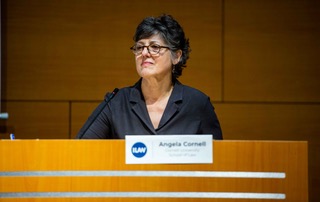
Oct 9, 2022
As the world witnesses some of the greatest challenges to democratic governments since the 1930s, unions offer a strong and essential counter to the trend, according to Cornell University Professor Angela Cornell.
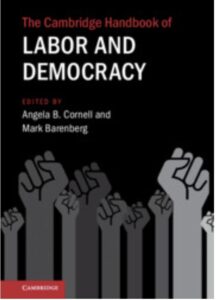 “Many studies show that organized labor has played critical role in developing and defending democracy. The organized working class was the primary carrier of democracy,” Cornell said today at the International Lawyers Assisting Workers Network (ILAW) Conference opening plenary.
“Many studies show that organized labor has played critical role in developing and defending democracy. The organized working class was the primary carrier of democracy,” Cornell said today at the International Lawyers Assisting Workers Network (ILAW) Conference opening plenary.
Cornell, co-editor of The Cambridge Handbook of Labor and Democracy, along with several book contributors, opened the Conference’s third and final day with a discussion of the handbook, an interdisciplinary and cross-regional anthology. (Hear Cornell and ILAW Board member Mery Laura Perdomo discuss unions and democracy on a recent Solidarity Center Podcast.)
More than 130 labor lawyers from 42 countries meeting October 7–9 also focused their final day on developing plans for Network’s coming years.
The Solidarity Center launched the ILAW Network in December 2018 as a global hub for worker rights lawyers to facilitate innovative litigation, help spread the adoption of pro-worker legislation and defeat anti-worker laws.
Unions Fuel Democracy
More than one quarter of the world’s population now live under democratically backsliding governments, including some of the world’s largest democracies.
Cornell listed the ways in which unions fuel democracy, including by providing a counterviling role to corporate power.
Further, said Cornell, “new research on the role of unions and in building solidarity among their members demonstrates the ways in which unions can bridge racial and national divides. Union members are less likely to support extreme views.”
Economic inequality is a destabiizing influence in most countries, Cornell said, and unions decrease inequality.
“Unions have been instrumental in the passsage of labor protections and the social safety net, including social security, minimum wage and overtime, workplace heath and safety and medical leave, among others.”
Unions Build Democracy in Latin America, Africa
Ken Roberts, a professor at Cornell University and book contributor, overviewed how unions have been bulwarks of democracy throughout Latin America.
“Labor has played a central role in trying to restore citizenship rights,” said Roberts. Since the 1960s–1980s, when unions suffered setbacks during military dictatorships and neoliberal reforms that prioritized the interests of the wealthy over working people, the key challenge has been to build broad coalitions, he said.

ITUC General Secretary Sharan Burrow
By joining with other movements, indigineous communities and territorially-based urban community networks, unions have created strong and successful coaltions. Since late 1990s as part of social pushback against neoliberal model, 14 countries have elected progressive governments and labor has been an important part of moving this unprecedented number of elections, he said.
Most recently, unions were part of successful coalitions that elected progressive governments in Honduras and Colombia and are constructing broad democratic fronts against new challenges from ethnonationalist and extreme conservative groups.
In Africa, “more often than not, unions were the only force fighting decolonization,” said Evance Kalula, chair of International Labor Organization (ILO) Committee on Freedom of Association and emeritus prof of law at the University of Capetown. “Formal and informal collaboration between unions as agents of change and nationalist movements.”
Kalula and co-author Chanda Chungu, contributed the chapter on “African Perspectives on Labor Rights as Enhancers of Democratic Governance.”
Julia Lopez Lopez, a professor at the University of Barcelona, described how unions are standing up to corporations that are using the new model of app-based work to exploit transportaton workers.
“The case of transport sector is one of the cases that show unions are trying to create new strategies against market intervention against multinational efforts to liberalize labor rights,” she said.
Lopez recently participated in research projects on precarious work and social rights led by the Working Lives Research Institute.
Closing the Conference, Sharan Burrow, general secretary of the International Trade Union Confederation (ITUC), overviewed the challenges facing workers and their advocates and pointed to recent legal successes as well, including an agreement that the ITUC and ILO achieved with the Qatar government that ensures more rights for migrant workers, including the freedom to leave their jobs and seek alternative employment.
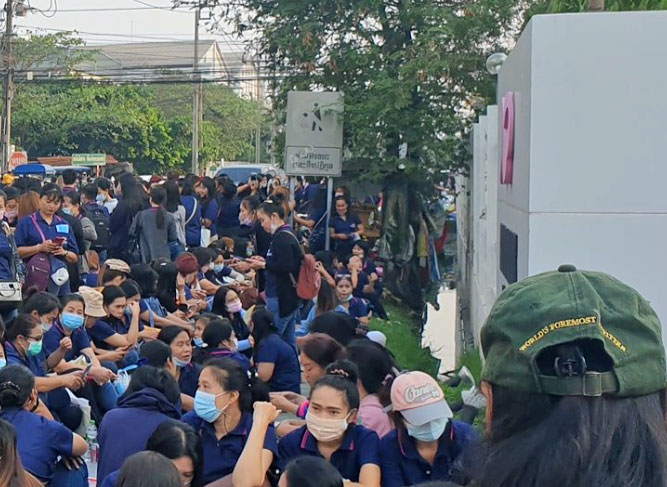
May 25, 2022
Agreement, the Largest Wage-Theft Settlement at a Garment Factory, Follows Year-Long Advocacy by International Labor Rights Advocates
The Solidarity Center and the Worker Rights Consortium (WRC) announced today that more than 1,250 Thai workers who sewed bras for Victoria’s Secret, Lane Bryant, and Torrid—and who were fired in 2021 without their legally mandated severance—have received $8.3 million (281 million baht) in compensation. The groups credited the decision of Victoria’s Secret to finance the payments, via a loan arrangement with the workers’ former employer.
Sycamore Partners, the parent of Lane Bryant and Torrid, did not contribute.
“This is a huge victory for the workers and a testament to the courage of their union and the strength of the international solidarity campaign that supported them,” said David Welsh, Thailand country director of the Solidarity Center. “Low-wage garment workers left destitute by injustice meted out by global supply chains is nothing new. What’s new is they did not accept their fate—and won. We also hope this represents a model for the type of domestic, governmental, international and brand engagement to resolve future cases where garment workers are left in similarly desperate straits. It’s an historic case given the amount of the settlement and again, hopefully, a model for the global garment industry going forward in terms of direct brand involvement’.
The workers are represented by the Triumph International Union, affiliated with the Confederation of Industrial Labour of Thailand.
“Our organization has documented hundreds of cases of wage theft in the apparel supply chain,” said Scott Nova, Executive Director of the WRC. “This was the largest theft—and now the most back pay—we’ve ever seen at an individual garment factory. The $8.3 million provided by Victoria’s Secret is also the most any brand has ever contributed to help resolve a wage theft case.”
After the Brilliant Alliance factory closed in March 2021, the Thai government ordered its owner, Hong Kong-based Clover Group, to pay severance within 30 days. Clover refused, telling the factory’s 1,250 low-wage workers it had no money and they should agree to wait 10 years to be paid in full.
With the Solidarity Center’s support and advocacy, the union launched a campaign demanding their severance pay. The WRC and Solidarity Center engaged Victoria’s Secret and Sycamore, pressing them to ensure the workers were paid. The WRC identified other brands that did not use Brilliant Alliance, but had influence over Clover and over a key business partner, Brandix, a Sri Lankan apparel supplier: American Eagle Outfitters, Gap, and PVH. After months of efforts, including campaigning by Clean Clothes Campaign, Remake, and other nonprofit worker advocacy organizations participating in the global #PayYourWorkers coalition, Clover agreed to pay the workers and Victoria’s Secret committed to finance the payments, via a loan to Clover. Last week, all workers received their severance, plus over one million dollars in interest, per Thai law.
Sycamore Partners ignored entreaties and did nothing to support the workers.
“Many of the workers were at the factory for well over a decade and they earned very substantial severance,” said Welsh, noting that the average Brilliant Alliance worker received the equivalent of more than two years’ wages and some received as much as four years’ pay.
“The severance these workers earned was effectively their life’s savings,” said Nova, “stolen from them when they were fired and now restored.” He continued, “Victoria’s Secret should be very proud of what it has done here. The people who run Sycamore Partners should hang their heads in shame.”
###
The Solidarity Center can arrange worker interviews upon request.
Notes:
- While most garment-producing countries require severance, non-payment is a chronic problem in the apparel industry. For more information on severance theft, see Fired, Then Robbed: Fashion brands’ complicity in wage theft during Covid-19, available here.
- Before closing Brilliant Alliance, Clover Group formed a partnership with Sri Lanka-based Brandix, one of the world’s largest clothing manufacturers. All of Clover’s factories were included in the new company, except Brilliant Alliance, allowing Clover and Brandix to profit from Clover’s assets and its ongoing brand relationships, while the Brilliant Alliance workers went unpaid.
- Hundreds of civil society organizations, including trade unions and labor rights groups, along with the Solidarity Center and the WRC, have endorsed #PayYourWorkers, an effort to press apparel brands to join with unions to create a global severance guarantee fund, thereby putting an end to severance theft in the global apparel industry.







 “Many studies show that organized labor has played critical role in developing and defending democracy. The organized working class was the primary carrier of democracy,” Cornell said today at the International Lawyers Assisting Workers Network (
“Many studies show that organized labor has played critical role in developing and defending democracy. The organized working class was the primary carrier of democracy,” Cornell said today at the International Lawyers Assisting Workers Network (
